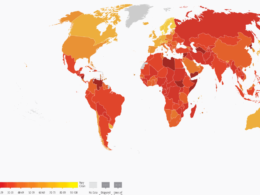Kyndryl, an IT infrastructure services provider, has released the second Global Sustainability Barometer study, commissioned by Microsoft and conducted by Ecosystm. The study reveals that while 84% of organisations prioritise sustainability goals, only 21% are using technology to reduce their environmental footprint and shape their overall sustainability strategies. Despite this gap, the study indicates progress, with 38% of organisations increasing their sustainability goals and programme execution since last year, reflecting a growing commitment to a green future.
“As the world faces increasing climate-related challenges, businesses are under pressure to act decisively and place sustainability at the forefront — and this year’s Global Sustainability Barometer study highlights that organisations must move from intent to collective action to drive change,” said Faith Taylor, Chief Corporate Citizenship and Sustainability Officer at Kyndryl.
Taylor added, “By integrating sustainability into a company’s business strategy, processes and systems, organisations can maximise the value of their people and technology to achieve internal goals and deliver positive impact.”
The study highlights several areas where companies can improve their sustainability efforts. Only 21% of organisations globally recognise technology’s role in both reducing carbon footprints and advancing broader sustainability objectives. Furthermore, while 54% of businesses integrate sustainability goals into existing reporting processes, just 19% fully use data for strategic planning and decision-making. Additionally, although 55% of organisations believe AI will significantly impact their sustainability goals, 62% limit AI initiatives to analysing historical data for monitoring and reporting purposes, rather than using it to forecast energy needs or improve operational efficiencies.
Matthew Sekol, a Sustainability Global Black Belt at Microsoft said, “Companies can gain the insights needed to deliver on their commitments and drive resilience by integrating sustainability data with operational and financial data, and using traditional data analytics and robust AI tooling to reshape operational efficiencies and foster sustainable innovations.”
The study also provides actionable recommendations for organisations aiming to strengthen their sustainability strategies. One key area is the integration of technology into strategic planning. While 38% of companies use IT to reduce their environmental impact, only 17% are utilising data and technology to achieve their sustainability goals. To realise their full potential, companies should embed technology into their sustainability strategies to turn abstract goals into actionable plans.
The study also found that 62% of organisations use AI to monitor energy consumption and emissions, but only 37% use predictive AI for forecasting energy needs. Companies should consider adopting AI-powered scenario planning and climate risk mitigation to create a more holistic approach to environmental responsibility, enabling them to better prepare for future challenges.
Another challenge highlighted in the study is the lack of integration across data systems, as only 15% of organisations use data to guide their business transformation. By improving data integration, companies can gain a more comprehensive understanding of their environmental impact, leading to more informed sustainability decisions. Additionally, fostering a culture of collective responsibility, involving cross-functional teams, particularly finance and technology, is crucial for making sustainability a core business priority.
Lastly, the study raises concerns over the environmental impact of AI itself. Only 35% of organisations are considering the energy implications of their AI solutions. “As organisations increasingly recognise sustainability as a strategic imperative, we’re witnessing a surge of innovation and collaboration. AI is at the forefront of this movement, empowering businesses to optimise resource consumption, reduce waste and drive positive environmental impact,” said Ullrich Loeffler, CEO & Co-Founder of Ecosystm.





















